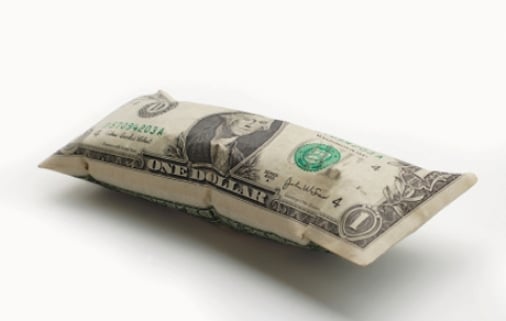Punishing savers is not the right way to cure what's ailing the U.S.
Inflation is sometimes referred to as a hidden tax. Unlike other taxes, it doesn't require legislation by Congress or the states. It doesn't merit a line item on the 1040 federal income-tax form many Americans will file this week. And it doesn't appear on the bottom of sales' receipts as a percentage markup on the things we buy.
Yet, like a tax, it takes resources out of the economy and redirects them to less productive uses. It distorts price signals and leads to a misallocation of capital. It's a silent way for the government and central bank to devalue the currency, raise prices, help borrowers and punish savers.
And it's exactly the wrong prescription for the U.S.
The official push for higher inflation as a cure for a sluggish U.S. recovery began about two years ago with a paper by International Monetary Fund economists, including Chief Economist Olivier Blanchard, titled “Rethinking Macroeconomic Policy.”
Other notables jumped on board, including Harvard's Ken Rogoff (does he think this time is different?) and Greg Mankiw, an economic adviser to President George W. Bush. In their view, higher inflation would accelerate the deleveraging process by allowing debtors -- including the U.S. government -- to pay back their loans in devalued dollars. (Score: borrowers 1, savers 0.)
More Is Better?
Princeton University's Paul Krugman, another advocate of higher inflation, argued in his April 5 New York Times column that 3 percent or 4 percent inflation would “almost surely help the economy.” It would do this by eroding the real value of debt and discouraging businesses and consumers from sitting on cash.
If 3 to 4 percent inflation can do all that, just think what 6 to 8 percent could do!
And that's one of the problems with targeting a little more inflation: You may end up with a lot. The Federal Reserve's balance sheet is stuffed with $1.5 trillion of excess reserves, or inflation tinder. At some point, banks will find a more profitable way of exploiting the deposits currently earning 0.25 percent interest at the Fed: making loans, for example, which increases the money supply.
What's more, there's the issue of credibility.
“It took three decades for people to believe the Fed was serious about committing to a long-range inflation goal of about 2 percent,” says Jim Glassman, senior U.S. economist at JPMorgan Chase & Co. If the Fed were to go back on its word, “never again would you listen to what the central bank said,” he says. “Investors would demand a higher risk premium.”
Glassman says all this sounds like something cooked up in the classroom, which it is. Because the nominal funds rate can't go below zero, raising inflation expectations lowers the real funds rate, which is already negative, and makes borrowing more enticing. So much for the needed deleveraging.
And what about long-term interest rates, which seem to be the Fed's obsession? Nominal long rates would adjust to incorporate higher inflation expectations; the yield curve would steepen; and the Fed, in a state of panic over rising mortgage rates, would tee up QE7, or whatever round of quantitative easing we're up to by then.
Step back from the “how to” discussion for a moment and consider the “why.” There is something fundamentally wrong when government prescribes the same policies that got us into this mess as the solution. The U.S. lives beyond its means. The federal government is running a trillion-dollar deficit for the fourth consecutive year, compounding its inability to make good on promises it has made to future retirees. Consumers binged on credit because home ownership was touted as a reliable piggy bank. All the postmortems on the financial crisis emphasized the need to save more, consume less.
Cause and Cure
Yet somehow the trip to bountiful now goes through Debtville and Inflation City? All the incentives are pointed in that direction. The Fed'sbenchmark rate has been at 0 to 0.25 percent since December 2008. If Fed Chairman Ben Bernanke has his way -- that is, unless events divert him from his chosen course -- it will be at zero until late 2014, a total of six years.
Would anyone involved in financial markets have believed you if you had told him 25 years ago that the U.S. economy would require near-zerointerest rates for this long a period?
If we need to save more, both individually and as a nation, the Fed shouldn't encourage us to spend, spend, spend. (Score: borrowers 2, savers 0.) And some economists want to introduce higher inflation into this toxic mix?
I have started to hear smart people, not conspiracy theorists, wonder if Bernanke isn't willing to err on the side of higher inflation to help the U.S. government defray its $15.6 trillion debt burden. That's not a reputation enhancer.
Bernanke is a student of history, and right now the chapter on the Great Depression has more dog-eared pages than the one on 1970s stagflation. That's too bad because there's enough historical “evidence Bernanke could use to start exiting before inflation gets ahead of him,” says Marvin Goodfriend, a professor of economics at Carnegie Mellon University in Pittsburgh and a former research director at the Richmond Fed.
It doesn't sound as if pre-emption has a place in Bernanke's toolkit. Perhaps he will prove to have an uncanny sense of timing, but if history is any guide, the Fed will be late to normalize interest rates. Which means we can all look forward to some of that silent inflation tax when we file our returns next year.
--Bloomberg News--
(Caroline Baum, author of “Just What I Said,” is a Bloomberg View columnist. The opinions expressed are her own.)







